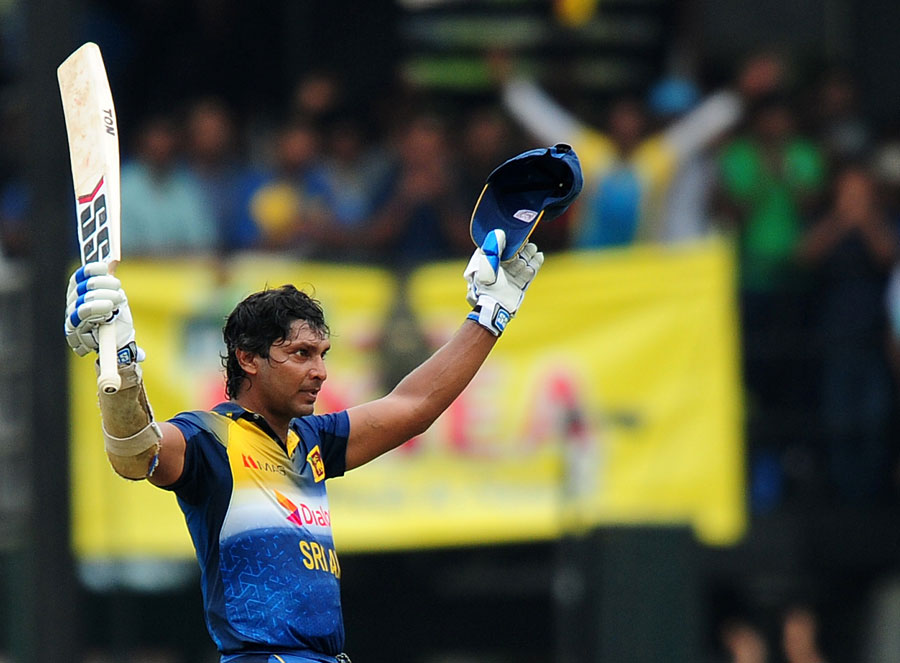Kumar Sangakkara
Rob Smyth

|
|||
|
Related Links
Players/Officials:
Kumar Sangakkara
Teams:
Sri Lanka
|
|||
Every sportsman has his equivalent of the bucket list - or for cricketers, perhaps, a coffin list. In 2014 Kumar Sangakkara ticked off the most important items remaining on his. It was his year of fulfilment; one which ensured, in sporting terms, he could die happy.
By far the most important task was winning a major trophy with Sri Lanka ,which he personally took care of with a fine unbeaten 52 in the World Twenty20 final against India, when destiny was clay in his hands. There was also a triple-century, a first Test hundred at Lord's, and proof - to himself as well as others - that he could succeed in English conditions, as well as help Sri Lanka win series there. He was like a man getting his affairs in order before he goes.
In a sense, so were we: you don't know what you've got until it's about to go, and this was the year in which Sangakkara was finally recognised as one of the all-time greats. For a decade and a half he had stealthily compiled an unanswerable body of evidence. Sangakkara hasn't had salad days: he's had salad years. And 2014 was the best of the lot. He scored 2,868 international runs, breaking Ricky Ponting's record for a calendar year; 971 of them came against England, whose bowlers grew sick of the sight of him.
Lovers of the game did not necessarily share their view. Sangakkara's cover-drive - often down on one knee - is so harmonious it could help facilitate world peace. He provides the best of all worlds: were there a Venn diagram of style and substance, Sangakkara would be right in the middle. Barring a spectacular downturn in form, he will pull off the rare trick of leaving the audience wanting more, despite being around for 15 years. He has never been better, neither more statesmanlike off the field, nor more lordly on it.
Few cricketers have put their myriad experiences to such good use. Sangakkara, though blessed with talent, is a force of nurture, who has filed away the 40,000-plus deliveries he has faced in international cricket in a mental dossier. He knows his game like the back of his bat. It is almost watertight - but that is not enough. Sangakkara still strives for improvement, whether that means playing two Championship games for Durham to acclimatise to English conditions, or spending three days in the nets recalibrating his game, as he did after a double failure against New Zealand's Trent Boult at the end of 2014. The result was an innings of 203, in a total of 356, in the first Test of the New Year, at Wellington.
The word is usually associated with bowlers, but Sangakkara's batting in 2014 was all about control. His hundreds are generally indistinguishable to the point of cliche: the certainty that numbs bowlers, the Fairy Liquid hands, the imperceptible gear changes. His management of risk, particularly in limited-overs cricket, is a thing of wonder: he turns run-chases into run-strolls, and to watch him pace an innings is to realise that all the computer data in the world will never trump the human brain.
Sangakkara challenges the notion that one-day cricket is a young man's game. By rights he should be a cricketing Luddite. Yet he has embraced the new world - of Twenty20, of scoring 300-plus in 50-over games - without compromising the old. In one-day internationals last year 68 players hit more than his four sixes, but nobody made more runs. He is the grandad who can dance at the disco without embarrassing anyone, and from whom the youngsters could learn a few moves.
They could learn plenty about the dying art of batting time as well. Sangakkara's 221 against Pakistan at Galle - in which he continued his mastery of Saeed Ajmal - spanned 698 minutes. His 147 at Lord's lasted 449, and he was at the crease for 551 when he pummelled 319 against Bangladesh (he also scored a hundred in the second innings, to emulate Graham Gooch against India at Lord's in 1990). There is an occasional tendency to dismiss Sangakkara because of his voracity against Bangladesh and Zimbabwe, even though his statistics are superb without those matches. It feels a little unfair, the product of casual western discrimination against Asian batsmen. Nobody marks Ponting down because he averaged 26 in India.
Overall, Sangakkara's Test average of 58.66 is the highest among those with 20 or more innings since Graeme Pollock (60.97) played his last Test in 1969-70, and in 82 Tests as a specialist batsman he averages 69. In January 2015, he was still throwing himself around behind the stumps at the age of 37, beating Adam Gilchrist's record of 472 dismissals in one-day internationals. These are eye-popping numbers, and we are all guilty of taking them for granted.
After his achievements in 2014, Sangakkara's CV is among the most complete in the history of the game (he becomes the second player, after Virender Sehwag, to win this award twice). Yet some of his most precious moments of the year will not be found there: stumping James Tredwell off his close friend Mahela Jayawardene to end their final one-day international on home soil, the kind of indulgence that gives schmaltz a good name; and the loving reception during his final match at Pallekele.
The chants of "Sanga! Sanga!" filled the air before, during and long after his brilliant century. Those chants were the soundtrack to the post-match press conference, during which even the inscrutable Sangakkara broke into a smile. Such moments are too organic and unplannable to put on a coffin list, yet they will keep him warm during his retirement.

